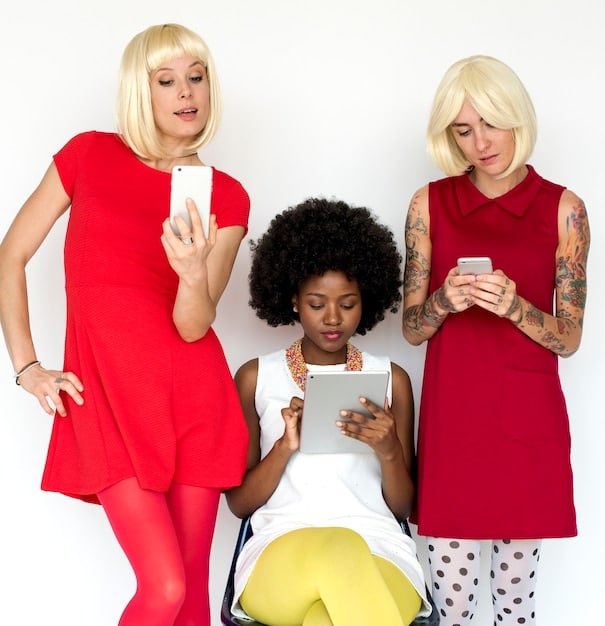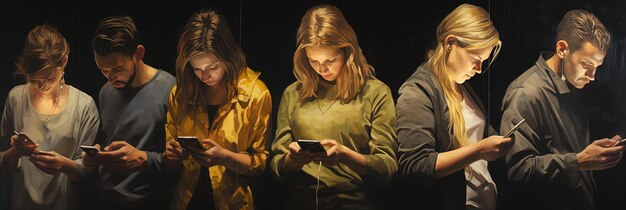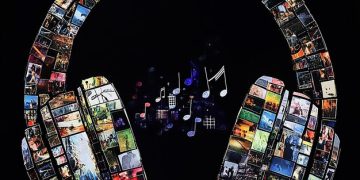Pop Culture’s Role in Shaping Identity: A Generational Perspective

Pop culture critically shapes individual and collective identities across generations, influencing values, behaviors, and worldviews through media, trends, and shared experiences.
In an ever-evolving world, understanding Pop Culture’s Role in Shaping Identity: A Generational Perspective is crucial. From the music we listen to to the shows we stream, popular culture isn’t just entertainment; it’s a profound force that molds who we are and how we perceive the world. Let’s delve into how these universal narratives and trends influence self-perception and collective consciousness across diverse age groups.
The Genesis of Generational Identity Through Pop Culture
Decades ago, before the hyper-connectivity of the digital age, popular culture acted as a more segmented mirror for societal values and individual aspirations. Each generation developed distinct characteristics, often defined by the media consumed and the historical context they inhabited. Popular culture, in essence, became a key determinant of collective identity, etching itself onto the very fabric of how societies viewed themselves.
The shared experience of consuming popular media—be it radio dramas, early television shows, or cinema—created common ground for understanding generational norms and breaking perceived boundaries. It was through these cultural artifacts that the youth of successive eras began to forge their own narrative, separating themselves from the preceding generation while simultaneously building upon their foundations. This process was not merely about entertainment; it was about defining an era’s collective personality.
From Post-War America to the Baby Boomers
Following World War II, a sense of unity and shared national purpose permeated American society. Pop culture, reflected in wholesome family sitcoms, swing music, and an optimistic outlook, often reinforced traditional values. However, as the 1960s dawned, the Baby Boomers began to challenge these norms, finding their voice in rock and roll, counter-culture movements, and protest songs. Music, in particular, became a powerful vehicle for expressing dissent and shaping a new, more rebellious identity.
- Music’s Unifying Power: Rock and roll provided a soundtrack for social change.
- Television’s Influence: Shows like “Leave It to Beaver” initially reinforced idealized family structures, while later programs began to subtly question them.
- Fashion as Rebellion: The shift from conservative attire to more expressive, youth-driven styles.
This period marked a significant departure, where pop culture wasn’t just a reflection but an active shaper of change. It provided a vocabulary and a common set of symbols for a generation seeking to redefine fundamental societal structures, impacting everything from politics to personal relationships. The stories told and the music played directly influenced how young individuals saw their place in a rapidly changing globe.
Gen X and the Rise of Cynicism and Individuality
Born into a world of economic uncertainty and technological advancement, Generation X gravitated towards a more cynical yet independent identity. Their pop culture embraced grunge music, independent films, and a nascent internet, rejecting the idealism of the Boomers. This era emphasized authenticity and a do-it-yourself ethos, fostering a unique sense of individualism that celebrated difference rather than conformity. The rise of cable television and specialized music channels further fragmented media consumption, allowing for more niche identities to emerge.
The defining characteristic of Gen X’s relationship with pop culture was its ambivalence. They consumed it, but often with a critical eye, deconstructing its messages and rejecting overt commercialism. This led to the flourishing of subcultures and a greater emphasis on individualistic expression, a stark contrast to the mass movements of previous decades. It was a time when identifying with specific bands or movies became a personal statement, intricately woven into one’s sense of self.
Millennials: Digital Natives and the Dawn of Globalized Pop Culture
Millennials, the first truly digital native generation, experienced a seismic shift in how popular culture was consumed and created. The advent of the internet, social media, and streaming platforms democratized access to content, breaking down geographical and cultural barriers. This era saw the rise of globalized pop culture, where trends could originate anywhere and rapidly spread worldwide, influencing identity on an unprecedented scale. Identity formation for Millennials was deeply intertwined with online communities and digital self-expression, fostering a sense of interconnectedness despite physical distances.
The proliferation of curated content feeds and personalized recommendations meant that while global trends were accessible, individual consumption patterns became increasingly unique. This created a tension between shared global experiences and highly individualized digital echo chambers. For many Millennials, online personas became as significant as off-line identities, with pop culture providing the language and imagery to construct these digital selves. Their engagement with pop culture often involved not just consumption, but active participation through fan communities, content creation, and social commentary, blurring the lines between audience and creator.
The Impact of Social Media and Reality Television
Social media platforms like MySpace and later Facebook, Twitter, and Instagram became central to Millennial identity formation. These platforms allowed for the constant curation of self-image, with pop culture trends providing the aesthetics and narratives for this digital presentation. Reality television, which gained significant traction during this period, offered a new kind of “relatable” celebrity, blurring the lines between aspiration and everyday life. This dynamic influenced how Millennials perceived success, beauty, and social status.
- Instant Trend Adoption: Memes and viral content shaped humor and communication.
- Curated Self-Image: Social media profiles became extensions of personal identity.
- Influencer Culture: The rise of “influencers” presenting aspirational lifestyles.

The constant stream of information and instant gratification fostered by early digital platforms created a generation accustomed to immediate feedback and validation. Pop culture’s rapid cycles of trends and viral phenomena reinforced this, encouraging continuous engagement and adaptation. This environment profoundly influenced how Millennials expressed their individuality and sought belonging within a vast, interconnected digital landscape, where shared cultural references often superseded traditional community bonds.
Gen Z: Authenticity, Activism, and Hyper-Personalized Narratives
Generation Z, having grown up entirely immersed in a digital world, takes the concept of globalized and personalized pop culture to a new level. For Gen Z, authenticity, social justice, and self-expression are paramount, deeply woven into their interaction with pop culture. They are adept at navigating diverse online communities, often forming identities around niche interests and values. Their consumption habits are highly fragmented, favoring short-form content, direct communication with creators, and platforms that allow for genuine, unfiltered expression.
Unlike previous generations, Gen Z often views pop culture as a tool for advocacy and social change. They are quick to call out perceived hypocrisy or injustice, leveraging their collective digital voice to amplify causes. This generation’s identity is intrinsically linked to their online self, but with a greater emphasis on transparency and rawness, contrasting with the more polished digital personas of Millennials. Pop culture for Gen Z is less about passive consumption and more about active participation, creation, and collaboration, often leading to rapid-fire trend cycles and democratized celebrity.
TikTok, Streaming, and the Creator Economy
TikTok is a prime example of Gen Z’s relationship with pop culture, offering a platform where anyone can become a creator and trends emerge organically from user-generated content. Streaming services provide an endless array of hyper-personalized niche content, moving away from mass-appeal blockbusters. This has fostered an environment where individuality is celebrated, and diverse identities can find representation and connection. The “creator economy” empowers this generation to not just consume but actively shape the narratives that define their culture and, consequently, their identities.
- DIY Content Creation: Accessible tools for video editing and music production.
- Niche Communities: Finding belonging in highly specific online groups.
- Values-Driven Consumption: Supporting brands and creators aligned with their social beliefs.
The ephemeral nature of many Gen Z pop culture trends reflects their fast-paced digital lives and their desire for constant novelty. This doesn’t mean their identities are fleeting, but rather adaptable and fluid, capable of integrating new influences rapidly. Their willingness to experiment with various subcultures and modes of self-expression suggests a generation that values genuine connection and personal resonance over broad, externally imposed cultural labels.
Pop Culture as a Mirror and a Molder: The Dual Role
Pop culture’s impact on identity is a complex interplay of reflection and direction. On one hand, it mirrors societal values, anxieties, and aspirations, providing a snapshot of the collective psyche at any given time. On the other hand, it actively molds these identities, introducing new ideas, legitimizing certain behaviors, and shaping aspirations. This dual role means that pop culture isn’t just a byproduct of identity; it’s a dynamic force that continuously redefines what it means to be human in a specific historical and technological context. The cyclical nature of trends and the resurgence of past aesthetics further illustrate this intricate relationship, as each generation reinterprets and recontextualizes previous cultural touchstones.
This push-and-pull creates a dynamic cultural landscape where generational identities are always in flux. What was once niche becomes mainstream, and once dominant forms of media give way to new ones. The way these shifts occur—whether through technological innovation, social movements, or evolving tastes—directly impacts how individuals within each generation construct their sense of self. The more aware we become of this intricate dance between culture and identity, the better we can understand the underlying currents that shape our collective future.
The Echo Chamber Effect and Identity Affirmation
In the digital age, accessible content means individuals can immerse themselves in highly specific cultural niches, creating powerful echo chambers. While this can affirm and strengthen existing identities, it can also limit exposure to diverse perspectives. Pop culture, through algorithms, often reinforces what we already believe or consume, leading to deeply entrenched sub-identities but potentially hindering broader understanding. This affirmation can be incredibly validating, especially for marginalized groups seeking representation, but it also presents challenges for social cohesion and cross-generational dialogue. Navigating this landscape requires a conscious effort to seek out varied viewpoints.
The comfort of the cultural echo chamber can lead to a stronger sense of belonging within a specific group, where shared cultural references become a shorthand for understanding and connection. However, it also means that the exposure to alternative narratives or challenging perspectives is diminished. This selective exposure to pop culture content contributes significantly to the unique identity markers that separate generations, making it sometimes difficult to bridge the communication gaps that arise from different cultural diets. Understanding these mechanisms is key to fostering intergenerational empathy.
Identity Crisis vs. Identity Fluidity
Some argue that the sheer volume and rapid pace of pop culture trends contribute to an “identity crisis” among younger generations, constantly shifting their self-definition. Conversely, others suggest it fosters “identity fluidity,” allowing individuals to openly explore and adopt various facets of identity without strict adherence to a single archetype. This fluidity is particularly evident in how younger generations embrace diverse gender expressions, sexual orientations, and cultural influences, facilitated by pop culture’s increasing representation of formerly marginalized identities. The contemporary landscape offers more avenues for self-discovery and expression than ever before.

This dynamic tension highlights the ongoing evolution of identity itself. Is it a fixed construct, or something constantly being remade and refined? Pop culture, with its continuous cycle of creation and reinvention, suggests the latter. It provides a playground for experimentation, where individuals can try on different identities, explore new ways of being, and ultimately arrive at a more nuanced and authentic understanding of themselves. The ability to switch between personas, to embrace multiple affiliations, is a hallmark of contemporary identity formation, largely powered by the endless buffet of popular culture.
The Future of Identity and Pop Culture: A Symbiotic Evolution
As we look to the future, the symbiotic relationship between identity and pop culture will only deepen. Technological advancements like virtual reality, augmented reality, and AI-driven content creation will further blur the lines between passive consumption and active participation. Future generations may inhabit entirely personalized cultural ecosystems, where their identities are shaped by AI-curated experiences that cater precisely to their evolving preferences. This could lead to unprecedented levels of self-affirmation and connection within niche communities, but also raise questions about shared cultural narratives and collective understanding.
The challenge for future generations will be to navigate this increasingly complex and fragmented cultural landscape without losing a sense of common humanity. Pop culture, in its most idealized form, can be a bridge—a shared language that transcends individual differences. However, if unmanaged, the hyper-personalization of culture could lead to deeper societal divisions, where distinct generational identities struggle to find common ground. The ongoing evolution of this relationship will require conscious effort to balance individual freedom of expression with the need for unifying cultural experiences, shaping not just who we are, but who we become as a society.
Ultimately, pop culture remains a powerful lens through which we understand ourselves and others. Its influence on identity is not static; it responds to and shapes societal shifts, creating a continuous feedback loop. Recognizing this dynamic interplay is essential for comprehending the nuances of generational differences and for envisioning a future where culture continues to enrich, rather than fragment, human experience. The narratives we consume today are the building blocks of the identities of tomorrow, underscoring the profound responsibility that creators and consumers alike hold in this cultural exchange.
| Key Point | Brief Description |
|---|---|
| Generation 🗣️ | Each generation shapes its identity through distinct pop culture influences like music, TV, and digital media. |
| Medium’s Evolution 💻 | From traditional media to social platforms, how content is consumed dictates identity formation. |
| Identity Dynamic 🔄 | Pop culture both reflects and molds individual and collective identities, creating a continuous feedback loop. |
| Future Impact 🔮 | Future tech will further personalize culture, posing challenges and opportunities for shared experiences. |
Frequently Asked Questions
▼
Baby Boomers’ identity was significantly shaped by post-war optimism and later, the counter-culture movements of the 1960s. Music, especially rock and folk genres, played a crucial role in expressing their disillusionment with traditional values and advocating for social change, fostering a collective identity centered on idealism and activism.
▼
For Generation X, pop culture fostered a more cynical, individualistic identity, largely influenced by grunge music, independent films, and the early internet. This generation valued authenticity and self-reliance, pushing back against mainstream consumerism and shaping their identities around niche interests and subcultures rather than mass movements.
▼
Digital advancements profoundly impacted Millennial identity, as they were the first true digital natives. Social media, streaming, and early online communities allowed for globalized pop culture consumption and digital self-expression. This led to curated online personas and a sense of belonging through shared virtual spaces, blurring the lines between online and offline identity.
▼
Gen Z’s identity is shaped by pop culture through a focus on authenticity, activism, and hyper-personalization. Platforms like TikTok enable user-generated content and rapid trend cycles, fostering identities rooted in niche communities and social justice. This generation actively participates in shaping culture and values transparency in their digital personas.
▼
The vast and rapidly changing nature of pop culture can lead to both. While some argue it contributes to an “identity crisis” due to constant shifts, others suggest it fosters “identity fluidity.” This fluidity allows individuals, particularly younger generations, to explore and adopt diverse facets of identity, embracing greater self-expression in a dynamic cultural landscape.
Conclusion
The intricate dance between pop culture and identity across generations is a testament to the profound influence media, trends, and shared experiences hold over who we are. From the unifying anthems of the Baby Boomers to the hyper-personalized digital realms of Gen Z, popular culture constantly reflects, challenges, and redefines our sense of self and our place within a collective. Understanding these generational shifts not only illuminates the past but also provides crucial insights into the evolving human experience, reminding us that culture is not merely consumed, but lived, breathed, and embodied.





